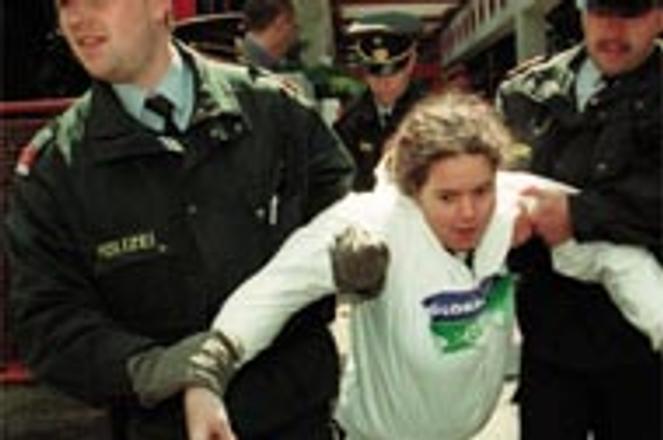Futility. A greenpeace activist is removed by Austrian police from the Slovak embassy in Vienna.TASR
A nuclear chain reaction was launched in the first reactor of Slovakia's new Mochovce nuclear power plant on June 8. With the plant's activation, a six week dispute on the safety of the Mochovce project reached critical mass as well, as top Austrian politicians and environmentalists erupted in protest.
The biggest bone of contention regarding Mochovce has been the public statements issued by Wolfgang Kromp, the Austrian leader of a 22-member international team of experts that had inspected Mochovce in early May. Kromp cited various safety risks that remained at Mochovce, and warned the public in mid-May that activating Mochovce might cause "the biggest accident imaginable with catastrophic consequences for the surrounding area."
But other nuclear experts who had been present during the inspection publicly refuted his words, adding credence to Slovak claims that the Austrian government was using bogus safety concerns to play to a fiercely anti-nuclear domestic audience.
Expert views
Robert Budnitz, an American nuclear safety expert who participated in the Mochovce inspection, told The Slovak Spectator on May 28 that Kromp's safety concerns were not shared by many experts. "I do not believe there are fundamentally different views among the real experts of the group," he said.
In the inspection team's unofficial preliminary report, released on May 28, Kromp stated that the gist of the team's concerns was that the container vessel covering the reactor might crack after 20 to 25 years of operation. The report also cited several other Mochovce features that, according to Kromp, did not meet Western European safety standards.
Budnitz said that he did not agree with the report's conclusions. "I feel particularly strongly that I do not endorse the findings of the provisional interim report [which says that] there are things that have to be done before unit one can go critical," Budnitz said. He explained that unanimity on Mochovce was hard to achieve among the group's 22 members, but stressed that the final report which is to be issued by June 22 would be a unanimous statement.
Jozef Zlatňanský, Vice-Chairman of the Nuclear Supervision Office, said that despite Kromp's warning, the reactor's pressure vessel had been given a clean bill of health. He added that the preliminary report was full of irrelevant objections that had nothing to do with true safety hazards, such as uninsulated window frames or garbage within the plant's premises. "The report is of the same quality as the experts who wrote it," Zlatňanský said.
The Mečiar syndrome
Slovak Premier Vladimír Mečiar, speaking at a June 5 rally in the eastern Slovak city of Košice, attempted to end the ongoing dispute about whether the plant should be activated. Having again dismissed foreign concerns, Mečiar swore to the crowd, "If I have to, I will go and turn [the plant] on myself. And if it blows up, you can begin calling me 'the enlightened man'." Mečiar then promised that the plant would be activated within 48 hours.
Mochovce was duly activated on June 8. "Today, in the early morning hours, the process of activating...the reactor in the first block of the nuclear power station at Mochovce took place," said Rastislav Petrech, the plant's spokesman, adding that the reactor was running at a minimum testing output.
Austrian Chancellor Viktor Klima launched an immediate protest against the Slovak decision. "I regard this not only as an unfriendly act by Slovakia but also as highly irresponsible," Klima said, adding that he was considering recalling Austria's ambassador to Slovakia, Gabrielle Matzner-Holz, for consultation. But on the following day, Klima said it would be better if Matzner-Holz stayed in Slovakia for the sake of preserving communication links with the Mečiar government.
Those links have recently been severely strained. Several weeks of diplomatic pressure were necessary before Slovakia agreed to hold talks on Mochovce with Austria under the auspices of the International Atomic Energy Agency (IAEA), a United Nations nuclear safety watchdog based in Vienna.
However, the Austrian side claimed that Mochovce was activated before experts from the two countries reached any conclusions in the IAEA talks, which had only started June 5. Klima also maintained that Mečiar had broken a mutual agreement by not officially informing the Austrian side of the start-up in advance. "We had agreed that all security questions should be resolved before activation," Klima said.
Mečiar spokesman Marián Kardoš told the Slovak opposition daily SME that Mečiar had never agreed with Klima to inform Austria of the decision. "[Activating Mochovce] is out of the [Slovak] government's competence anyway," Kardoš said.
Meanwhile, environmentalists intensified their protests with several staged events, some of which were sparsely attended. On May 22, 15 activists from the Global 2000 environmental group invaded the Slovak Embassy in Vienna and barricaded themselves in the building before being removed and detained by the Austrian police several hours later.
But a June 7 anti-Mochovce demonstration, which had been organized in Vienna by Greenpeace activists expecting thousands of anxious supporters, attracted only 50 people, most of whom showed up in front of the IAEA building and left within one hour.


